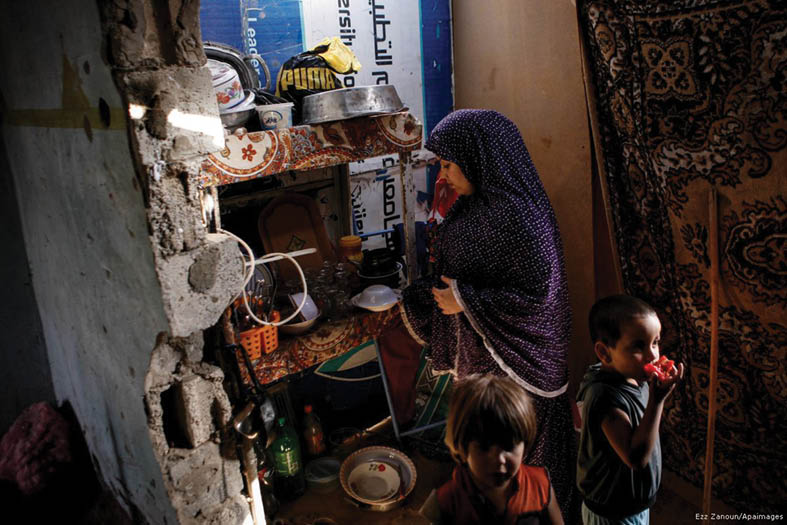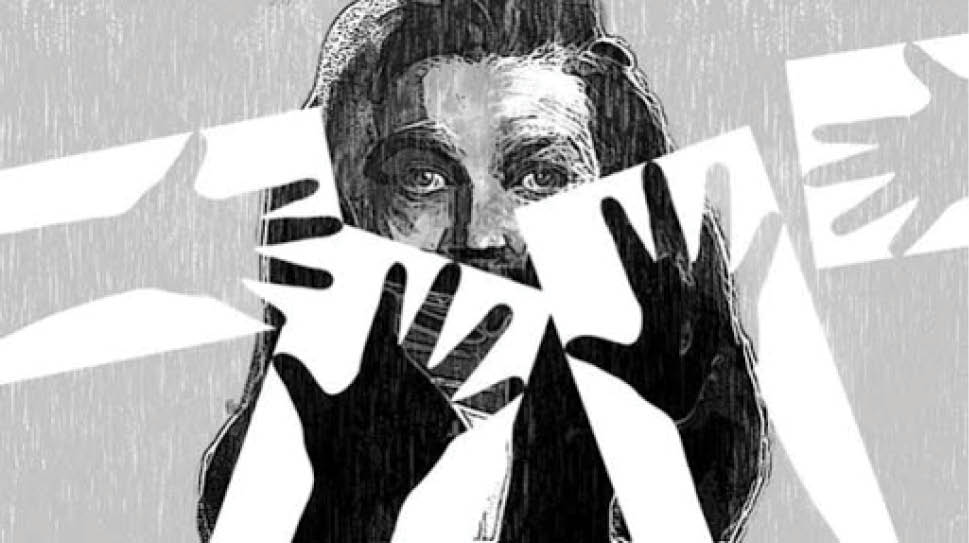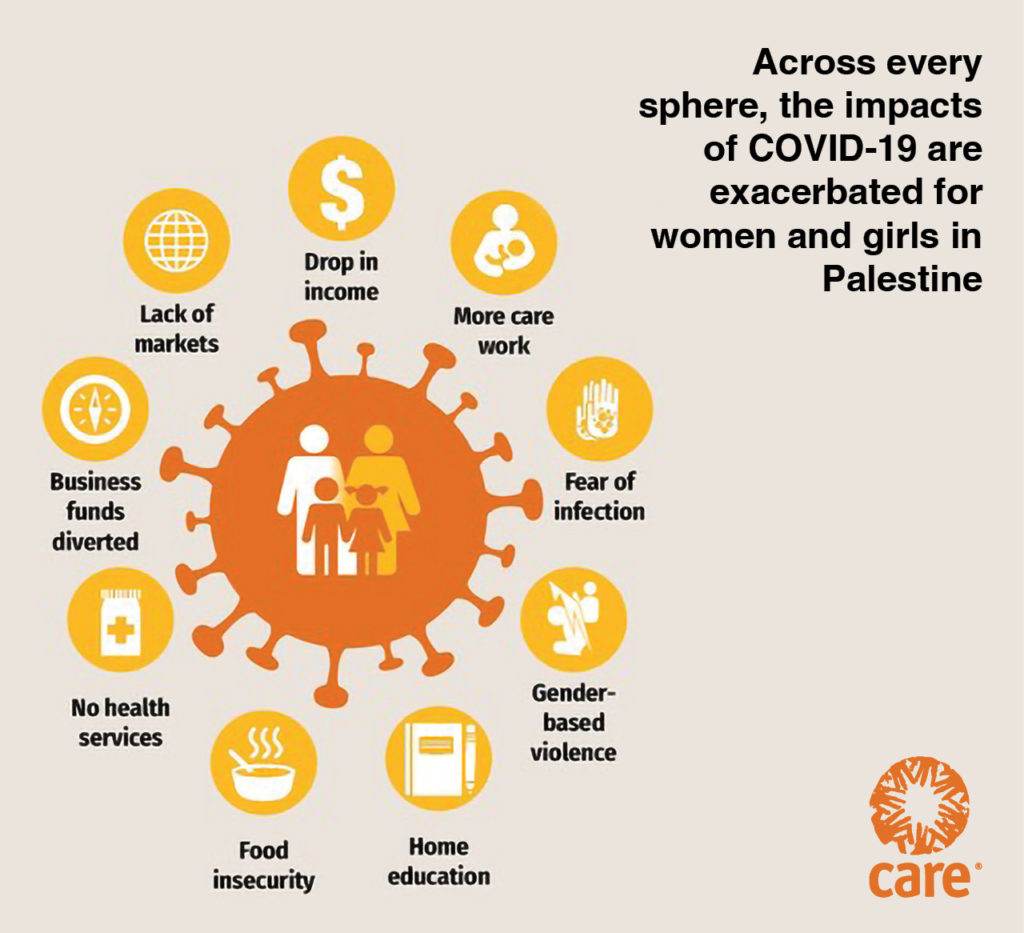CARE Palestine West Bank/Gaza (WBG) conducted a Rapid Gender Assessment (RGA) in April 2020, through structured interviews with 51 respondents (18 males, 33 females), between the ages of 23 and 54 years old. The survey targeted 31 persons from the West Bank and 20 from the Gaza Strip, living in 12 different governorates (Bethlehem, Hebron, Jenin, Ramallah, Nablus, Jericho, Salfeet, Tubas, Deir Al-Balah, Beit Lahia, Rafah, and Gaza City). Forty percent of respondents live in urban areas, 36 percent in rural areas, and 23 percent in refugee camps. Seven respondents were pregnant or lactating. Sixteen percent were from female-headed households.*1
Food insecurity since the outbreak of COVID-19 has increased, with evidence showing that female-headed households are more likely to reduce the quality and quantity of food consumption and adopt negative coping strategies. They use coping mechanisms to adapt their dietary intake by eating less-preferred or cheaper food, borrowing food or relying on help from others, limiting their own portion sizes, limiting intake to allow small children to eat, and reducing the number of meals they eat per day. Females are significantly more often found to borrow food or rely on help from others.
The key advocacy points on emerging gender impacts include engagement to combat increasing food insecurity since the outbreak of COVID-19, protection with a focus on gender-based violence (GBV), efforts to counter political and community exclusion of women from leadership roles, help with decision-making and coping mechanisms, securing access to financial resources, and alleviating the impact on women’s economic empowerment, as well as securing access to humanitarian basic needs, services, and information.
Protection must be provided with a focus on gender-based violence (GBV), as it appears to have increased among Palestinians since the onset of the crisis and limitations on movement. CARE has noted an increase in security concerns facing women and girls related to GBV, intimate-partner violence, and domestic violence. One-third of male and female respondents specifically stated that GBV was an increased risk for women and girls in the crisis. In addition, an increase in violence has been reported by young men and adolescent boys who are calling the helpline to speak about abuse they are facing from their fathers, mothers, and siblings at home.*2 Violence may increase due to confinement and forced coexistence, restrictions on movement, economic challenges, food insecurity, and fears of exposure to the virus.

The political and community exclusion from leadership roles remains an issue for women during the novel coronavirus pandemic. Female participation in community and political organizations that support the COVID-19 response is marginal, with implications for its reach and impact. Even though women constitute a majority of frontline healthcare workers, which places them in prime positions to identify trends at the local level, they continue to form only small minorities in national and global health leadership, emergency committees, financial committees, and other COVID-10 response committees.
In Gaza, more than 45 percent of those staying in quarantine centers are women, whereas all the medical and security staff stationed there are men. The prevalence of male security and medical staff responding to COVID-19 places barriers for women in accessing healthcare, mental health support, basic hygiene needs, and their fundamental rights to privacy and comfort – particularly given prevalent social and cultural taboos about gender mixing.

Decision-making dynamics and coping mechanisms remain unchanged. Males continue to have greater control than females over family resources and over the ways in which said resources are spent and/or allocated, indicating that COVID-19 has had neither a positive nor negative impact on the preexisting decision-making dynamics on the household level.
Access to financial resources has been affected by the pandemic. Report findings indicate a significant decline in livelihoods and income in Palestine as a result of the crisis. Respondents noted that their paid hours had been cut by about one-third with no additional income sources available. In nearly every respect, however, females found that earning a living during the outbreak was more difficult than for male respondents. Thus, female respondents reported a decline in home-based business activities. They were also more impacted by a lack of inputs and shuttered bank services. Both men and women, however, reported the inability to access services, extension agents, and skills development opportunities during the crisis.
Women’s economic empowerment was strongly impacted by COVID-19. A majority (89 percent) of female small-business owners were forced to reallocate money previously dedicated to their work or business to the household in order to cope during the crisis. Some female respondents in CARE’s assessment were obligated to take measures to mitigate these problems through such means as suspending businesses, changing the type of production, reducing working hours and prices, and customizing production.
The main priority needs for female and male respondents are livelihoods, shelter, water, and healthcare.
Access to humanitarian basic needs, services, and information was hindered, as fewer female respondents (58 percent) than male (86 percent) reported safe access to health facilities inside and outside their communities. While women indicated lack of cash and inability to travel as the primary reasons, men reported that said facilities were not functioning. Most respondents had not received any humanitarian assistance during the crisis. The majority also noted hygiene as the most pressing and unmet need. The majority of respondents used the internet to stay informed on COVID-19 and related messages, while also accessing social media and the Ministry of Health information outlets to a lesser degree. All the female respondents need further information about accessing medical and health services.

As recommendations for the way forward, a number of measures can be taken at this time to achieve a more inclusive and just society. First and foremost, the Palestinian Authority, community organizations, health responders, policymakers, and all other humanitarian actors must support the inclusion of women frontline responders, women leaders, women-led organizations/networks, and youth groups as important partners in the COVID-19 response.
Second, national authorities, the private sector, and humanitarian and development actors should prioritize investment in adapted women’s economic empowerment initiatives, such as remote micro, small, and medium enterprises (MSMEs).
Third, national authorities, donors, and the international community must strengthen the protection from and response to GBV as part of the COVID-19 response efforts, ensuring that funding is available to support protection-focused services. They must provide support to organizations with expert staff that offer GBV services, hotlines, and referrals, as well as remote and direct health and psychosocial response services for survivors, while expanding service availability.
“Women are the strongest fighters in the battle against the spread of the coronavirus. Not only do they fight for their own lives, they also fight for the lives of the whole community.”
Nahla – Small Enterprises Center in Gaza
Fourth, national authorities and key international actors must ensure that the specific needs of women, particularly those in the most at-risk populations, are met, including their physical, cultural, security, information, and sanitary needs. Hygiene needs should be a first priority.
Fifth, national authorities and key international actors should focus on socioeconomic policies and interventions that protect women from falling into poverty. Those who work in the informal sector must be supported through emergency cash transfers, loans, or small-scale grants. These policies should take into account the increased care burdens women face and encourage and apply gendered approaches to household-based decision-making and resource allocation, measures that will impact female enterprises.

Moreover, national authorities, supported by humanitarian actors, should guarantee that women – particularly refugees, cancer patients, those suffering from chronic diseases, and those with disabilities – have access to affordable, quality, and equitable healthcare services, including sexual and reproductive health and GBV services. Restrictions of movement, imposed to mitigate COVID-19, must take into consideration these vital health needs.
Importantly, international actors must urge Israeli authorities to ease movement restrictions for essential medical staff, enabling them to support the COVID-19 response while complying with the appropriate public health and safety arrangements. Israeli authorities must facilitate the work of humanitarian agencies that strive to continuously provide essential humanitarian services, including health, shelter, water and sanitation, food, education, and protection, in compliance with international humanitarian law.
And finally, enhancing access to information and material on the risks of COVID-19 should be a priority. Since Palestinians obtain most of their news from the internet, national authorities and humanitarian actors should strengthen reliable health and hygiene resources and make them known to the public. These efforts should include a campaign that aims to help information consumers discern true information from false reports.
*1 CARE Evaluations, “Executive summary Palestine West Bank/Gaza Rapid Gender Assessment Early Gender Impacts of the COVID-19 Pandemic,” May 5, 2020, available at http://www.careevaluations.org/evaluation/executive-summary-palestine-west-bank-gaza-rapid-gender-assessment-early-gender-impacts-of-the-covid-19-pandemic/.
*2 SAWA Organization, Fact Sheet #3, April 10, 2020.


